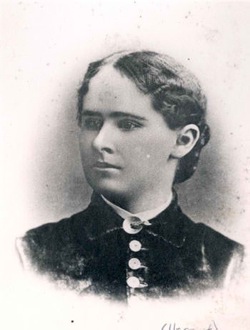In the Archives: Helping the Deserving Poor
Editor’s note: Laura Bien returns this month after a three-month hiatus from her In the Archives column for The Chronicle. Look for it in the future around the end of every month. For this column, she reviewed around 1,500 pages worth of meeting minutes from the Ypsilanti Home Association.
Nellie Smith* heard someone coming up the stairs and sat up in bed. She could see her breath in the late-winter afternoon light. Perhaps he had left something behind. She glanced around the room. There was nothing on the table, the chair, or the stove with the broken leg propped on a brick.
Knocks sounded. Nellie stood, shook out her ragged nightgown, and opened the door an inch. The friendly gaze of a middle-aged woman in a trim winter coat and long dark skirts met Nellie’s cautious look.

Harriet Gilbert as she looked around the time she was first elected Ypsilanti Home Association president in 1875, an office she held for over 30 years.
Lizzie Swaine introduced herself, apologized for the intrusion, and said there’d been word of a little difficulty at this Washington Street address. It felt cold here, she said – did Nellie have any fuel in the house? No, said Nellie, nor food either. Lizzie asked a few more questions, reassured her that help was coming, thanked her for her time, and left. Likely the women’s interaction was similar to this imagined scene.
What is a matter of record is that some days later Lizzie joined twelve other women for the May 1896 Ypsilanti Home Association meeting at Lovina Briggs’ Huron Street home. As Lizzie described Nellie’s plight, she may have noticed some raised eyebrows. The ladies discussed the case. Later, Association secretary Cleantha Dickinson paraphrased the talk in the 1896 meeting minutes logbook.
“Mrs. Swaine came to present the case of Mrs. Smith,” she wrote, “whom she found without a fire and about to be turned out of her rooms because she could not pay her rent.”
She continued, “Investigation among the ladies proved that the woman had a father and brother in comfortable circumstances who would not help the woman unless she behaved herself … it was found that she had been under arrest for keeping a disorderly house,” a euphemism referring at that time to prostitution.
She concluded, “The ladies decided they could not help her while she persisted in wrong doing.” Luckily, Nellie was an exception – the group helped most of those cases that came before it. [Full Story]



